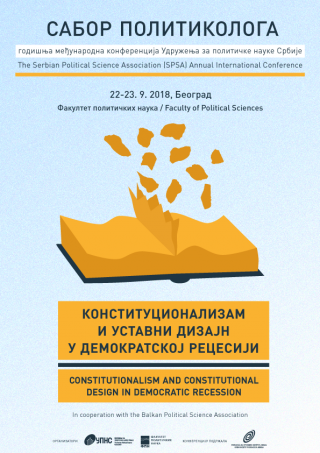Constitutions were seen as a crucial component of democratization and conflict regulation in the last few decades. As a result, related studies in normative political theory, constitutional law, comparative politics and democratisation studies grew substantially. And yet, global democratic recession, which have confronted old and new democracies in the last few years, raises important questions about the role of constitutionalism and constitutional design in the new context.
Traditionally, constitutionalism and democracy coexisted in mutual tension. Constitutionalists are sceptical towards democracy and believe that democracy should be reined in to limit government authority and protect individual rights. Democrats hold that constitutions impose illegitimate constraints on the majority and grant unelected minority of constitution interpreters excessive authority to make decisions on key issues that affect everyone. According to democratic critics of constitutionalism, these decisions are illegitimate and forward the interests of privileged minorities. This tension intensifies over the adjustments of constitutions to changed circumstances or new interpretations of constitutional provisions. Towards the end of the twentieth century, this tension was considered to had been resolved and that constitutionalism and democracy reinforced each other. However, this claim is being questioned again at a time of democratic recession and growing inequalities in a volatile international context. In new democracies – where neither liberal constitutionalism nor democracy are entrenched – the problem becomes even more pressing and results in multiple political and institutional drawbacks.
The expansion of scholarship on constitution making in the late 20thcentury originated from the rise of “new institutionalism” and from the “third wave” of democratization. Scholars in various social science disciplines increasingly focused on the origins, forms, dynamics and outcomes of institutions, very broadly conceived. Simultaneously, the global tide of authoritarian breakdown and emergence of new democracies revived interest in constitutional design as a vehicle for the promotion of democracy. As democratization coincided with increased rate of violent conflict in plural societies, the same prescription was deployed in the promotion of state- and democracy-building in plural societies. While there was a broad realisation that structural, cultural and international factors strongly influenced democratic development and ethnic conflict in the long run, constitutional change had the advantage of potentially having a major impact on democracy building and conflict regulation in the short to medium term.
The last flickers of the global ‘third wave’ of democratisation and the second wave of post-communist democratisation in the early 2000s increased the number of new democracies but also raised new questions. Were new democracies different from old ones? One answer was that, apart from institutions that narrowly regulated free and fair elections and basic freedoms, most new democracies were largely informally institutionalised, via clientelism and corruption. They lacked the rule of law and horizontal accountability, typical of most (but not all) old democracies, which in the long run undermined the quality of democracy and economic development.
In the last decade, there has been a global trend of democratic recession. Old democracies in Western Europe and new democracies in Southern Europe have witnessed the rise of populism, which has undermined constitutionalism. Post-communist democracies have found themselves not only experiencing populism but also authoritarian manipulation. In more extreme cases, such as in parts of the Balkans, democratic erosion is gradually turning new democracies back into hybrid regimes – where elections remain competitive but not free and fair and where freedoms of speech, press, assembly and association are systematically violated by regime incumbents.
What is the role of constitutionalism and constitutional design today, having in mind the trend of democratic recession in old and new democracies? While constitutional design used to be a major vehicle of democracy promotion, would-be autocrats now use it to consolidate their power and undermine opposition, weakening constitutionalism and democracy along the way. Recent institutional change in Hungary and Poland, including judicial reforms and/or electoral system change, and proposals for related institutional reforms in various other post-communist states, such as in Serbia, Croatia and other states in the Balkans, are examples in point. Moreover, authoritarian incumbents systematically violate existing procedures and freedoms, and use informal institutions to strengthen their power and undermine democratic opposition.
How should democrats, i.e., democratic opposition parties and civil society, respond to the abuses of constitutional design and systematic violations of democratic procedures and basic freedoms? Can constitutional design aid democratisation – or at least inhibit further democratic erosion at a time of global democratic recession? How should democrats use local knowledge and experience on constitutional design, as well as comparative insights from relevant cases abroad and support from international actors? Which strategies are available to local democratic forces at a time when earlier international supporters of democratization (explicitly or otherwise) acknowledge would-be autocrats in post-communist states as “factors of stability” and thus fail to challenge their undemocratic proposals for institutional change?
We invite scholars who work on constitutionalism, constitutional design, democracy and democratization and related fields,from various theoretical and methodological perspectives in political and social science and humanities,to submit paper proposals that focus on the following issues, broadly conceived:
- Populism and constitutionalism in old and new democracies
- Constitutional change in post-communist states in democratic recession
- Constitutional design and conflict in plural societies after communism
- Executive-legislative relations: parliamentarism and semi-presidentialism in post-communist states
- Electoral systems change in democratic recession
- Social aspects of constitutional reforms
- The legal and political role of constitutional courts
- Judicial reforms and democratic recession in post-communist states
- Informal institutions in new democracies: clientelism and corruption
- European Union and constitutional design in post-communist states
- Regional security in democratic recession
- Violations of press freedom and democratic responses
- Authoritarian manipulation via constitutional design
- The political sociology of populism
- Do authoritarian parties need an authoritarian social basis?
- Democratic responses to authoritarian abuses of constitutional design
International selection committee: Nenad Dimitrijević (Central European University, Budapest), Dimitrios Sotiropoulos (University of Athens), Nermina Mujagić (Fakultet političkih nauka, Sarajevo), Ana Matan (Fakultet političkih znanosti, Zagreb), Nenad Marković (Pravni fakultet, Skopje), Keići Kubo (Waseda University, Tokyo), Tanasije Marinković (Pravni fakultet, Belgrade), Bojan Todosijević (Institut društvenih nauka, Belgrade), Ilija Vujačić, Aleksandra Krstić, Jelena Lončar, Filip Ejdus andBojan Kovačević (Fakultet političkih nauka, Belgrade).


